(完整版)新概念英语第二册笔记第57课(最新整理)
裕兴新概念英语第二册笔记第57课之欧阳术创编

Lesson 57 Can I help you, madam? 您要买什么,夫人?Did the woman get what she wanted?A woman in jeans stood at the window of an expensive shop. Though she hesitated for a moment, she finally went in and asked to see a dress that was in the window. The assistant who served her did not like the way she was dressed. Glancing at her scornfully, he told her that the dress was sold. The woman walked out of the shop angrily and decided to punish the assistant next day. She returned to the shop the following morning dressed in a fur coat, with a handbag in one hand and a long umbrella in the other. After seeking out the rude assistant, she asked for the same dress. Not realizing who she was, the assistant was eager to serve her this time. With great difficulty, he climbed into the shop window to get the dress. As soon as she saw it, the woman said she did not like it. She enjoyed herself making the assistant bring almost everything in the window before finally buying the dress she had first asked for.参考译文一位穿着牛仔裤的妇女站在一家高档商店的橱窗前。
新概念英语第二册第57课

新概念英语第二册第57课Lesson 57 in the New Concept English Book 2 introduces the use of the modal verb "must" to express logical deduction or certainty.The lesson begins by explaining that 'must' is used when the speaker is certain about something because there is strong evidence or logical reasoning. For example, if we see dark clouds, we might say, "It must rain soon." In this case, we are not guessing; we are certain based on the evidence of dark clouds.The example demonstrates that we use 'must' to talk about the present or future. However, for the past, we use 'must have.' For instance, if we see someone coming in with a wet umbrella, we might remark, "It must have rained." Again, this deduction is based on a certain piece of evidence.The lesson further explains that if we think something is not possible, we use 'can't.' For instance, if we arrive at a bus stop and the bus has already left, we might say, "The bus can't still be here," implying that the bus has already left and it's impossible for it to still be there.The text also provides additional examples using 'must' and 'can't' for different situations. It discusses logical deductions such as a doctor telling a patient that they must rest, a car not starting because the battery is flat, and a small child unable to reach things on a high shelf.In conclusion, Lesson 57 emphasizes the use of 'must' and 'can't' to express logical deductions or certainty in English. These modal verbs are used to convey strong evidence orlogical reasoning regarding a particular situation in the present, future, or past.。
新概念英语第二册第57课

新概念英语第二册第57课Lesson 57 in the New Concept English Book 2 introduces the use of the modal verb "must" to express logical deduction or certainty.The lesson begins by explaining that 'must' is used when the speaker is certain about something because there is strong evidence or logical reasoning. For example, if we see dark clouds, we might say, "It must rain soon." In this case, we are not guessing; we are certain based on the evidence of dark clouds.The example demonstrates that we use 'must' to talk about the present or future. However, for the past, we use 'must have.' For instance, if we see someone coming in with a wet umbrella, we might remark, "It must have rained." Again, this deduction is based on a certain piece of evidence.The lesson further explains that if we think something is not possible, we use 'can't.' For instance, if we arrive at a bus stop and the bus has already left, we might say, "The bus can't still be here," implying that the bus has already left and it's impossible for it to still be there.The text also provides additional examples using 'must' and 'can't' for different situations. It discusses logical deductions such as a doctor telling a patient that they must rest, a car not starting because the battery is flat, and a small child unable to reach things on a high shelf.In conclusion, Lesson 57 emphasizes the use of 'must' and 'can't' to express logical deductions or certainty in English. These modal verbs are used to convey strong evidence orlogical reasoning regarding a particular situation in the present, future, or past.。
新概念第二册57课知识点
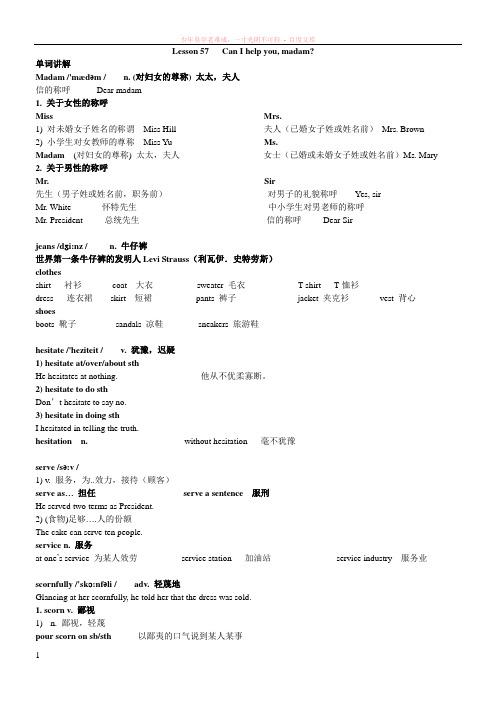
Lesson 57 Can I help you, madam?单词讲解Madam /'mædəm / n. (对妇女的尊称) 太太,夫人信的称呼Dear madam1. 关于女性的称呼Miss Mrs.1) 对未婚女子姓名的称谓Miss Hill 夫人(已婚女子姓或姓名前)Mrs. Brown2) 小学生对女教师的尊称Miss Yu Ms.Madam(对妇女的尊称) 太太,夫人女士(已婚或未婚女子姓或姓名前)Ms. Mary 2. 关于男性的称呼Mr. SirshirtdressshoesbootsDon’1) v.2) (食物)足够….人的份额The cake can serve ten people.service n. 服务at one’s service 为某人效劳service station 加油站service industry 服务业scornfully /'skɔ:nfəli / adv. 轻蔑地Glancing at her scornfully, he told her that the dress was sold.1. scorn v. 鄙视1)n. 鄙视,轻蔑pour scorn on sb/sth 以鄙夷的口气说到某人某事2) v. 鄙视,傲慢的拒绝scorn sb.’s invitation 傲慢的拒绝某人的邀请scorn sb.’s advice 鄙视某人的建议scorn sb.’s offer 拒绝某人的帮助2. scornful adj. 鄙视的,轻蔑的A scornful smile 鄙视的笑容 A scornful look 鄙视的表情punish /'pʌniʃ/ v. 惩罚1. punish sb. for sthThe teacher punished him for cheating on the exam.give a lesson to sb. 教训某人一顿teach sb. a lesson 教训某人一顿fur /fəinwear “穿着;戴着”,表示状态,宾语可以是衣帽,也可以是饰物、奖章等。
新概念英语第二册第57课-Can I help you, mad

新概念英语第二册第57课:Can I help you, mad(经典版)编制人:__________________审核人:__________________审批人:__________________编制单位:__________________编制时间:____年____月____日序言下载提示:该文档是本店铺精心编制而成的,希望大家下载后,能够帮助大家解决实际问题。
文档下载后可定制修改,请根据实际需要进行调整和使用,谢谢!并且,本店铺为大家提供各种类型的经典范文,如条据书信、合同协议、演讲致辞、规章制度、应急预案、读后感、观后感、好词好句、教学资料、其他范文等等,想了解不同范文格式和写法,敬请关注!Download tips: This document is carefully compiled by this editor. I hope that after you download it, it can help you solve practical problems. The document can be customized and modified after downloading, please adjust and use it according to actual needs, thank you!Moreover, our store provides various types of classic sample essays, such as policy letters, contract agreements, speeches, rules and regulations, emergency plans, reading feedback, observation feedback, good words and sentences, teaching materials, other sample essays, etc. If you want to learn about different sample formats and writing methods, please pay attention!新概念英语第二册第57课:Can I help you, mad 新概念英语第二册第57课:Can I help you, madam?(通用8篇)通过精心收集新概念英语第二册第57课:Can I help you, madam,下面是本店铺整理后的新概念英语第二册第57课:Can I help you,madam?,欢迎大家阅读借鉴,一起来看看吧。
裕兴新概念英语第二册笔记 第57课

11-16-2013madam n 太太,夫人jeans n 牛仔裤hesitate v serve v scornfully adv 轻蔑地punish v 惩罚fur n 裘皮eager adj madam 对女子的尊称(已婚,未婚者均可)Dear Sir 亲爱的先生Dear Madam 亲爱的女士miss 1对未婚女子姓名前的称为Miss Hill 希尔小姐The Miss world 世界小姐2小学生对女教师的尊称Mrs.夫人(已婚女子姓或者姓名前)Mrs.Jane Brown 布朗.简夫人Mr.(Mister)先生(男子姓或姓名前,职务前)Mr.Brown 布朗先生Mr.Chairman 主席先生Mr.President 总统先生Sir 1对男子的礼貌称呼egYes,sir. 是的长官。
2中小学生对男教师的称呼3信的称呼Dear sir/Dear Sir 敬启者Ms.女士(已婚或者未婚女子姓或者姓名前)Ms.Mary Green 格林.玛丽小姐jeans n close-fitting pants 牛仔裤wear jeans 穿牛仔裤(状态)blue jeans 蓝色的女仔裤bluejacket 水手,水兵hesitate v 迟疑,踌躇,犹豫hesitate at sth/hesitate about sth/hesitate over sth 对…犹豫,迟疑egShe hesitate before accepting his invitation.她在接受邀请之前非常犹豫。
egHe hesitates at nothing.他从不优柔寡断。
hesitate to do sth 犹豫做...egDon`t hesitate to tell me if you have any requests. 你有任何要求的话不要犹豫告诉我。
hesitate about wh (特殊疑问词引导宾语从句) 关于...犹豫egWe seldom hesitate about where to stay in Paris.关于在巴黎待在哪儿我们从来不犹豫。
Can I help you, madam?-新概念英语第二册自学导读笔记第57课
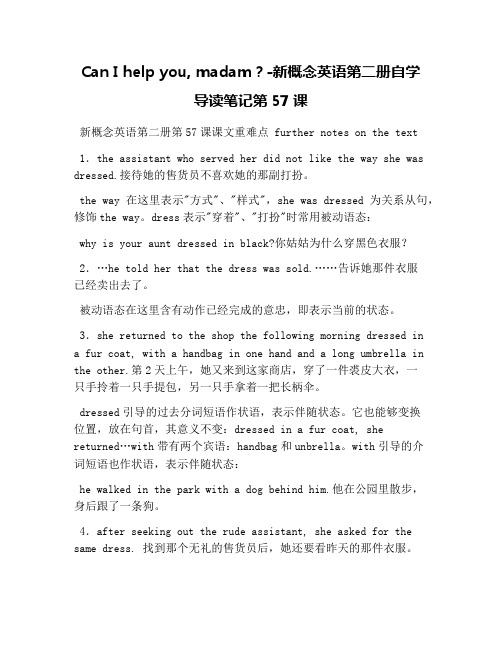
Can I help you, madam?-新概念英语第二册自学导读笔记第57课新概念英语第二册第57课课文重难点 further notes on the text1.the assistant who served her did not like the way she was dressed.接待她的售货员不喜欢她的那副打扮。
the way在这里表示"方式"、"样式",she was dressed为关系从句,修饰the way。
dress表示"穿着"、"打扮"时常用被动语态:why is your aunt dressed in black?你姑姑为什么穿黑色衣服?2.…he told her that the dress was sold.……告诉她那件衣服已经卖出去了。
被动语态在这里含有动作已经完成的意忠,即表示当前的状态。
3.she returned to the shop the following morning dressed in a fur coat, with a handbag in one hand and a long umbrella in the other.第2天上午,她又来到这家商店,穿了一件裘皮大衣,一只手拎着一只手提包,另一只手拿着一把长柄伞。
dressed引导的过去分词短语作状语,表示伴随状态。
它也能够变换位置,放在句首,其意义不变:dressed in a fur coat, she returned…with带有两个宾语:handbag和unbrella。
with引导的介词短语也作状语,表示伴随状态:he walked in the park with a dog behind him.他在公园里散步,身后跟了一条狗。
4.after seeking out the rude assistant, she asked for the same dress. 找到那个无礼的售货员后,她还要看昨天的那件衣服。
裕兴新概念英语第二册笔记_第57课_课文讲解

Textin jeans 是个介词短语没做后置定语,修饰woman.用 in 表达穿戴though 引导一句话是一个让步状语从句。
a dress that was in the window 橱窗里的衣服。
That 引导定语从句修饰dress 这个词。
who served her 是定语从句修饰 the assistant,意为招待她的售货员did not like the way she was dressed.不喜欢她打扮的方式。
She was dressed 是个定语从句,修饰the way the way she was dressed 她打扮的方式the way he talks 他讲话的方式the way he solved the problem 他解决问题的方式dress 1vt eg She dressed her baby.她给她的孩子穿衣服。
dress 强调动作,给谁穿衣2eg He dressed well.他穿着华丽。
dress 强调状态be dressed 穿着,打扮(强调状态)eg He was well dressed .他穿着华丽。
be dressed in穿着…衣服eg The lady was dressed in white at the party. 在派对上,那个女士穿着白衣服。
put on 穿,戴(强调动作)take off 脱掉(强调动作)eg wear穿着(强调状态),与be dressed in 相同egI wear jeans at home . 我在家穿着牛仔裤。
glancing at her scornfully 是个现在分词短语做伴随状语。
that the dress was sold "that 从句"做told 的宾语,是个宾语从句punish the assistant 教训这个售货员the following morning相当于 the next morning 第二天早上the following day相当于 the next day 第二天dressed in a fur coat 穿着裘皮大衣。
新概念英语第二册:第57课课文详解及语法解析
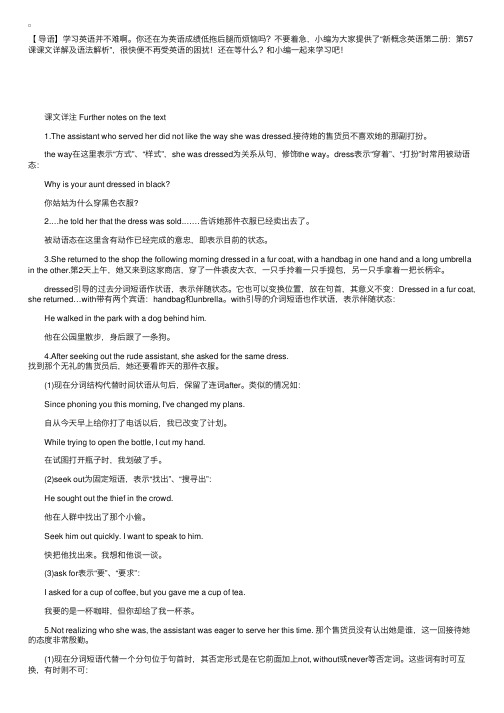
【导语】学习英语并不难啊。
你还在为英语成绩低拖后腿⽽烦恼吗?不要着急,⼩编为⼤家提供了“新概念英语第⼆册:第57课课⽂详解及语法解析”,很快便不再受英语的困扰!还在等什么?和⼩编⼀起来学习吧! 课⽂详注 Further notes on the text 1.The assistant who served her did not like the way she was dressed.接待她的售货员不喜欢她的那副打扮。
the way在这⾥表⽰“⽅式”、“样式”,she was dressed为关系从句,修饰the way。
dress表⽰“穿着”、“打扮”时常⽤被动语态: Why is your aunt dressed in black? 你姑姑为什么穿⿊⾊⾐服? 2.…he told her that the dress was sold.……告诉她那件⾐服已经卖出去了。
被动语态在这⾥含有动作已经完成的意忠,即表⽰⽬前的状态。
3.She returned to the shop the following morning dressed in a fur coat, with a handbag in one hand and a long umbrella in the other.第2天上午,她⼜来到这家商店,穿了⼀件裘⽪⼤⾐,⼀只⼿拎着⼀只⼿提包,另⼀只⼿拿着⼀把长柄伞。
dressed引导的过去分词短语作状语,表⽰伴随状态。
它也可以变换位置,放在句⾸,其意义不变:Dressed in a fur coat, she returned…with带有两个宾语:handbag和unbrella。
with引导的介词短语也作状语,表⽰伴随状态: He walked in the park with a dog behind him. 他在公园⾥散步,⾝后跟了⼀条狗。
4.After seeking out the rude assistant, she asked for the same dress.找到那个⽆礼的售货员后,她还要看昨天的那件⾐服。
新概念第二册第57课Can I help you,madam课文详解版 超级详细-

3)ask for表示“要”、“要求”: I asked for a cup of coffee, but you gave me a cup of tea. 我要的是一杯咖啡,但你却给了我一杯茶。
Not realizing who she was, the assistant was eager to serve her this time.
(1)现在分词短语代替一个分句位于句首时,其否定 形式是在它前面加上not, without或never等否定词。 这些词有时可互换,有时则不可 Not/Without/Never hesitating for a moment, he ran after the thief. 他没有一丝犹豫便追赶那小偷。 Not being able to open the door, I asked my neighbour for help. 由于开不了门,我便向邻居求援。
(2)seek out为固定短语,表示“找出”、“搜寻 出”: 他在人群中找出了那个小偷。 He sought out the thief in the crowd. 快把他找出来。我想和他谈一谈 Seek him out quickly. I want to speak to him.
After seeking out the rude assistant, she asked for the same dress.
(1)现在分词结构代替时间状语从句后,保留了连词 after。类似的情况如: Since phoning you this morning, I‘ve changed my plans. 自从今天早上给你打了电话以后,我已改变了计划。 While trying to open the bottle, I cut my hand. 在试图打开瓶子时,我划破了手。
新概念第二册第57课Can I help you,madam课文详解版 超级详细-

The assistant who served her did not like the way she was dressed.
该句为主从复合句 句子的主干为The assistant did not like the way. 其中主语assistant 后跟who 引导的定语从句 the way在这里表示“方式”、“样式”,she was dressed 为定语从句,修饰the way。 Way 后跟定语从句,可用that/in which/不加,来引导。 我不喜欢她吃饭的样子 I don’t like the way(that/in which/ /) she eats. 你能给我展示一下解决这个问题的方式吗 Can you show me the way(that/in which/ /) you solve the problem?
dress表示“穿着”、“打扮”时常用被动 语 Why is your aunt dressed in black? 你姑姑为什么穿黑色衣服? She is dressed in jeans. 她穿的牛仔裤
Glancing at her scornfully, he told her that the dress was sold.
Glance at 瞥一 scornfully 现在分 词短语做伴随状语
The woman walked out of the shop angrily and decided to punish the assistant next day.
Walk out 走出 Walk out of the shop 走出商店 Decide to do 决定做某事 Punish sb 惩罚某人
裕兴新概念英语第二册笔记第57课之欧阳歌谷创编
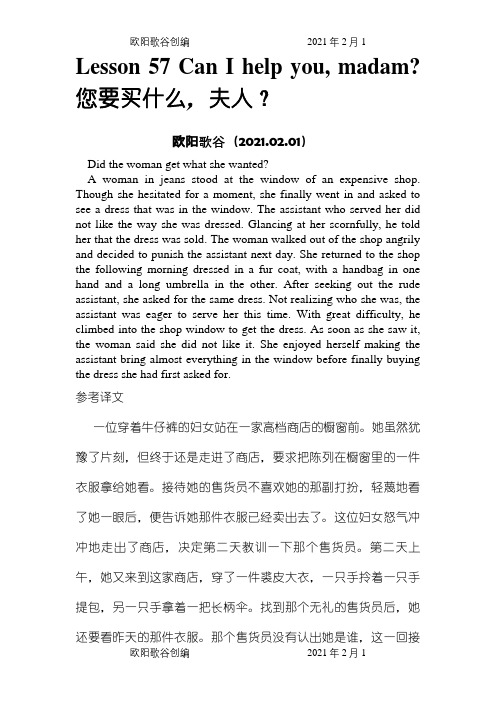
Lesson 57 Can I help you, madam? 您要买什么,夫人?欧阳歌谷(2021.02.01)Did the woman get what she wanted?A woman in jeans stood at the window of an expensive shop. Though she hesitated for a moment, she finally went in and asked to see a dress that was in the window. The assistant who served her did not like the way she was dressed. Glancing at her scornfully, he told her that the dress was sold. The woman walked out of the shop angrily and decided to punish the assistant next day. She returned to the shop the following morning dressed in a fur coat, with a handbag in one hand and a long umbrella in the other. After seeking out the rude assistant, she asked for the same dress. Not realizing who she was, the assistant was eager to serve her this time. With great difficulty, he climbed into the shop window to get the dress. As soon as she saw it, the woman said she did not like it. She enjoyed herself making the assistant bring almost everything in the window before finally buying the dress she had first asked for.参考译文一位穿着牛仔裤的妇女站在一家高档商店的橱窗前。
裕兴新概念英语第二册笔记第57课之欧阳文创编
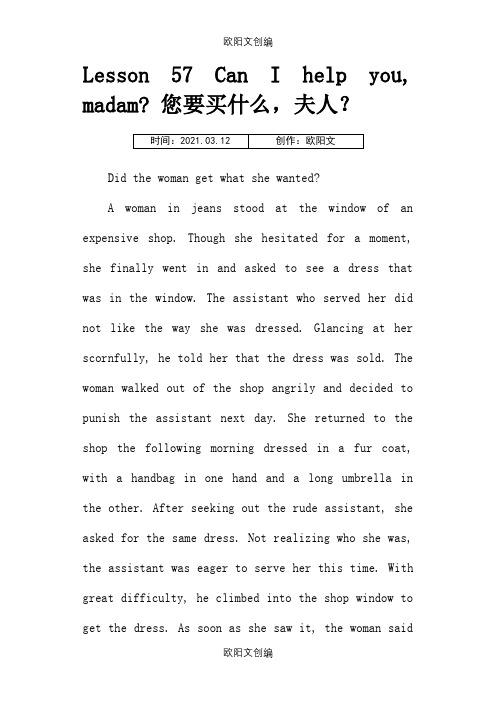
Lesson 57 Can I help you, madam? 您要买什么,夫人?Did the woman get what she wanted?A woman in jeans stood at the window of anexpensive shop. Though she hesitated for a moment,she finally went in and asked to see a dress thatwas in the window. The assistant who served her didnot like the way she was dressed. Glancing at herscornfully, he told her that the dress was sold. Thewoman walked out of the shop angrily and decided topunish the assistant next day. She returned to theshop the following morning dressed in a fur coat,with a handbag in one hand and a long umbrella inthe other. After seeking out the rude assistant, sheasked for the same dress. Not realizing who she was,the assistant was eager to serve her this time. Withgreat difficulty, he climbed into the shop window toget the dress. As soon as she saw it, the woman saidshe did not like it. She enjoyed herself making the assistant bring almost everything in the window before finally buying the dress she had first asked for.参考译文一位穿着牛仔裤的妇女站在一家高档商店的橱窗前。
(完整版)新概念英语第二册笔记第57课
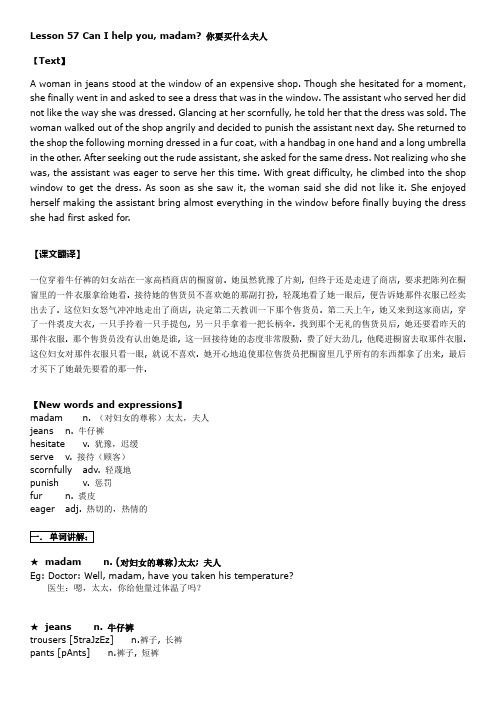
Lesson 57 Can I help you, madam? 你要买什么夫人【Text】A woman in jeans stood at the window of an expensive shop. Though she hesitated for a moment, she finally went in and asked to see a dress that was in the window. The assistant who served her did not like the way she was dressed. Glancing at her scornfully, he told her that the dress was sold. The woman walked out of the shop angrily and decided to punish the assistant next day. She returned to the shop the following morning dressed in a fur coat, with a handbag in one hand and a long umbrella in the other. After seeking out the rude assistant, she asked for the same dress. Not realizing who she was, the assistant was eager to serve her this time. With great difficulty, he climbed into the shop window to get the dress. As soon as she saw it, the woman said she did not like it. She enjoyed herself making the assistant bring almost everything in the window before finally buying the dress she had first asked for.【课文翻译】一位穿着牛仔裤的妇女站在一家高档商店的橱窗前. 她虽然犹豫了片刻, 但终于还是走进了商店, 要求把陈列在橱窗里的一件衣服拿给她看. 接待她的售货员不喜欢她的那副打扮, 轻蔑地看了她一眼后, 便告诉她那件衣服已经卖出去了. 这位妇女怒气冲冲地走出了商店, 决定第二天教训一下那个售货员. 第二天上午, 她又来到这家商店, 穿了一件裘皮大衣, 一只手拎着一只手提包, 另一只手拿着一把长柄伞. 找到那个无礼的售货员后, 她还要看昨天的那件衣服. 那个售货员没有认出她是谁, 这一回接待她的态度非常殷勤. 费了好大劲几, 他爬进橱窗去取那件衣服. 这位妇女对那件衣服只看一眼, 就说不喜欢. 她开心地迫使那位售货员把橱窗里几乎所有的东西都拿了出来, 最后才买下了她最先要看的那一件.【New words and expressions】madam n. (对妇女的尊称)太太,夫人jeans n. 牛仔裤hesitate v. 犹豫,迟缓serve v. 接待(顾客)scornfully adv. 轻蔑地punish v. 惩罚fur n. 裘皮eager adj. 热切的,热情的★madam n. (对妇女的尊称)太太; 夫人Eg: Doctor: Well, madam, have you taken his temperature?医生:嗯,太太,你给他量过体温了吗?★jeans n. 牛仔裤Eg: I quickly stripped my jeans off myself.我飞快地把我的牛仔裤脱掉★hesitate v. 犹豫, 迟疑hesitate to do sth. 犹豫做……make up one's mind 下决心做……hesitation [7hezi5teiFEn] n. 犹豫, 踌躇without hesitation 毫不犹豫Without hesitation he refused my request.★serve v. 接待(顾客)①vt.&vi. 帮佣,当仆人,给……干活serve sb. 为某人而服务Mary served (in) the family as a cook for more than ten years.②vt.&vi. 服务;服役;供职She served the firm as a secretary for two years.Have you ever served in the army?③vt.&vi. 接待(顾客)The assistant was eager to serve her this time.Tom served in a restaurant when he was 18.service [5sE:vis] n. 服务, 服务性工作, 服役, 仪式;vt. 保养, 维修adj.(军队)服现役的, 服务性的, 仆人的, 耐用的At your service. 乐于为您效劳。
裕兴新概念英语第二册笔记第57课之欧阳化创编
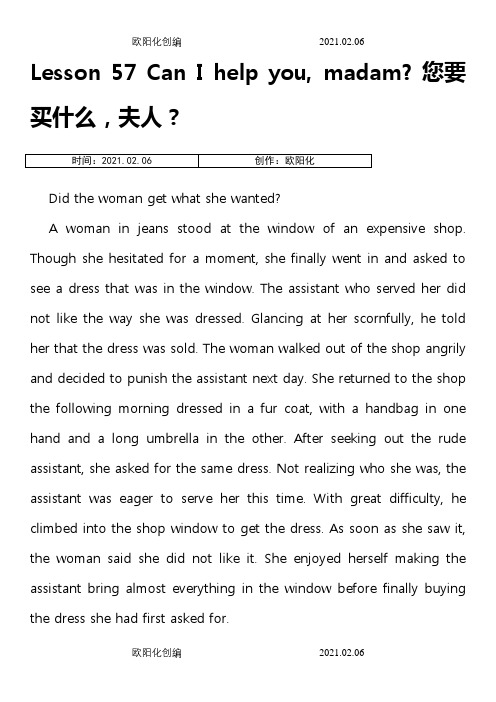
Lesson 57 Can I help you, madam? 您要买什么,夫人?Did the woman get what she wanted?A woman in jeans stood at the window of an expensive shop. Though she hesitated for a moment, she finally went in and asked to see a dress that was in the window. The assistant who served her did not like the way she was dressed. Glancing at her scornfully, he told her that the dress was sold. The woman walked out of the shop angrily and decided to punish the assistant next day. She returned to the shop the following morning dressed in a fur coat, with a handbag in one hand and a long umbrella in the other. After seeking out the rude assistant, she asked for the same dress. Not realizing who she was, the assistant was eager to serve her this time. With great difficulty, he climbed into the shop window to get the dress. As soon as she saw it, the woman said she did not like it. She enjoyed herself making the assistant bring almost everything in the window before finally buying the dress she had first asked for.参考译文一位穿着牛仔裤的妇女站在一家高档商店的橱窗前。
新概念二Lesson 57 知识点整理

Lesson 57 Can I help you, madam? 您要买什么,夫人?学习目标全解必记单词madam n. (对妇女的尊称)太太,夫人jeans n. 牛仔裤hesitate v. 犹豫,迟缓serve v. 接待(顾客)scornfully adv. 轻蔑地punish v. 惩罚fur n. 裘皮eager adj. 热切的,热情的常考短语hesitate for a moment 犹豫了一会seek out 找出glance at 撇一眼with great difficulty 很困难地the following morning 第二天早晨enjoy oneself 玩的开心be eager to do sth. 急于做某事经典句型1. A woman in jeans stood at the window of an expensive shop.Though she hesitated for a moment, she finally went in andasked to see a dress that was in the window.2. The assistant who served her did not like the way she wasdressed.3. Glancing at her scornfully, he told her that the dress was sold.The woman walked out of the shop angrily and decided topunish the assistant next day.4. She returned to the shop the following morning dressed in afur coat, with a handbag in one hand and a long umbrella in theother.5. After seeking out the rude assistant, she asked for the samedress.6. Not realizing who she was, the assistant was eager to serveher this time.7. With great difficulty, he climbed into the shop window to getthe dress.8. She enjoyed herself making the assistant bring almosteverything in the window before finally buying the dress shehad first asked for.重点语法介词at, in, off and with的用法在表示地点和位置时,说话人的个人角度会影响对介词的选择。
新概念英语第二册课堂笔记:第57课
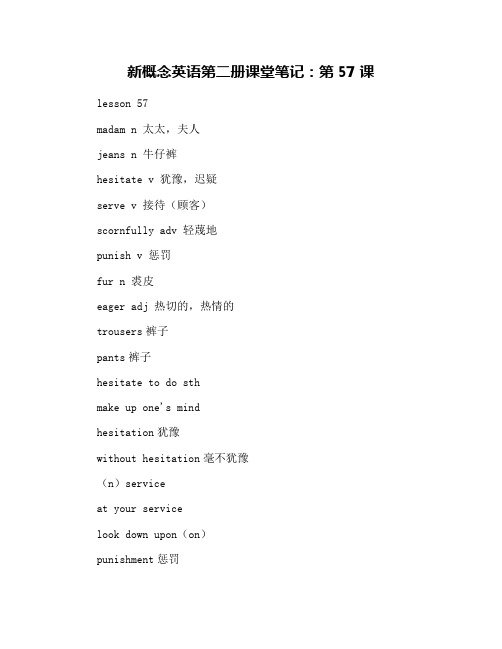
新概念英语第二册课堂笔记:第57课lesson 57madam n 太太,夫人jeans n 牛仔裤hesitate v 犹豫,迟疑serve v 接待(顾客)scornfully adv 轻蔑地punish v 惩罚fur n 裘皮eager adj 热切的,热情的trousers裤子pants裤子hesitate to do sthmake up one's mindhesitation犹豫without hesitation毫不犹豫(n)serviceat your servicelook down upon(on)punishment惩罚capital punishment极刑mink貂皮be eager to do 急于做某事textcan i help you,madam?A woman in blue jeans stood at the win-dow of an expensive shop. Though she hesitated for a moment, she finally wentin and asked to see a dress that was in the window. The assistant who served herdid not like the way she was dressed. Glancing at her scornfully, he told herthat the dress was sold. The womanwalked out of the shop angrily and de-cided to punish the assistant next day. She returned to the shop the following morning dressed in a fur coat, with a handbag in one hand and a long umbrellain the other. After seeking out the rude assistant she asked for the same dress.Not realizing who she was, the assistantwas eager to serve her this time with great difficulty, he climbed into the shopwindow to get the dress. As soon as she saw it, the woman said she did not like it.She enjoyed herself making the assistant bring almost everything in the windowbefore finally buying the dress she had first asked for.do window shopping(表示在橱窗外面购物)ask to do sthdress sb 给某人穿衣服i dress myself反身代词是不能做主语的be dressed inthe way 能够直接加定语从句,不需要引导词i cooked in the way you taught mewith sth in hand 手上拿着非谓语动词形式的否定词not一定要直接加在该结构的前面with great difficulty/troublehe had a lot of trouble climbing into the shop window to get the dressenjoy oneselfenjoy sth。
裕兴新概念英语第二册笔记第57课之欧阳家百创编
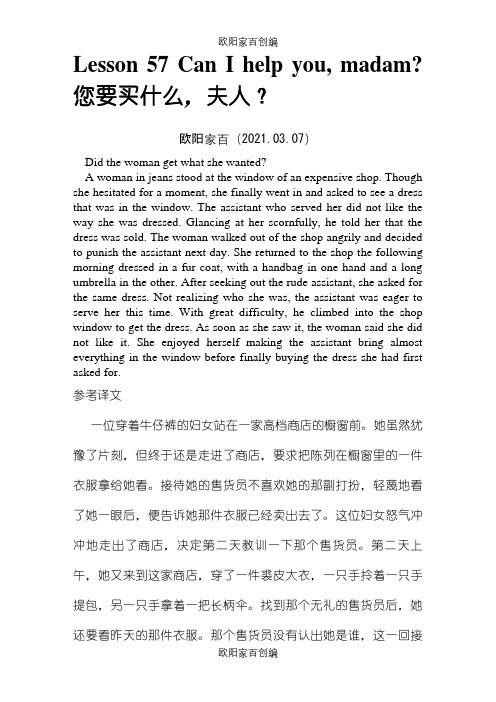
Lesson 57 Can I help you, madam? 您要买什么,夫人?欧阳家百(2021.03.07)Did the woman get what she wanted?A woman in jeans stood at the window of an expensive shop. Though she hesitated for a moment, she finally went in and asked to see a dress that was in the window. The assistant who served her did not like the way she was dressed. Glancing at her scornfully, he told her that the dress was sold. The woman walked out of the shop angrily and decided to punish the assistant next day. She returned to the shop the following morning dressed in a fur coat, with a handbag in one hand and a long umbrella in the other. After seeking out the rude assistant, she asked for the same dress. Not realizing who she was, the assistant was eager to serve her this time. With great difficulty, he climbed into the shop window to get the dress. As soon as she saw it, the woman said she did not like it. She enjoyed herself making the assistant bring almost everything in the window before finally buying the dress she had first asked for.参考译文一位穿着牛仔裤的妇女站在一家高档商店的橱窗前。
- 1、下载文档前请自行甄别文档内容的完整性,平台不提供额外的编辑、内容补充、找答案等附加服务。
- 2、"仅部分预览"的文档,不可在线预览部分如存在完整性等问题,可反馈申请退款(可完整预览的文档不适用该条件!)。
- 3、如文档侵犯您的权益,请联系客服反馈,我们会尽快为您处理(人工客服工作时间:9:00-18:30)。
Lesson 57 Can I help you, madam? 你要买什么夫人【Text】A woman in jeans stood at the window of an expensive shop. Though she hesitated for a moment, she finally went in and asked to see a dress that was in the window. The assistant who served her did not like the way she was dressed. Glancing at her scornfully, he told her that the dress was sold. The woman walked out of the shop angrily and decided to punish the assistant next day. She returned to the shop the following morning dressed in a fur coat, with a handbag in one hand and a long umbrella in the other. After seeking out the rude assistant, she asked for the same dress. Not realizing who she was, the assistant was eager to serve her this time. With great difficulty, he climbed into the shop window to get the dress. As soon as she saw it, the woman said she did not like it. She enjoyed herself making the assistant bring almost everything in the window before finally buying the dress she had first asked for.【课文翻译】一位穿着牛仔裤的妇女站在一家高档商店的橱窗前. 她虽然犹豫了片刻, 但终于还是走进了商店, 要求把陈列在橱窗里的一件衣服拿给她看. 接待她的售货员不喜欢她的那副打扮, 轻蔑地看了她一眼后, 便告诉她那件衣服已经卖出去了. 这位妇女怒气冲冲地走出了商店, 决定第二天教训一下那个售货员. 第二天上午, 她又来到这家商店, 穿了一件裘皮大衣, 一只手拎着一只手提包, 另一只手拿着一把长柄伞. 找到那个无礼的售货员后, 她还要看昨天的那件衣服. 那个售货员没有认出她是谁, 这一回接待她的态度非常殷勤. 费了好大劲几, 他爬进橱窗去取那件衣服. 这位妇女对那件衣服只看一眼, 就说不喜欢. 她开心地迫使那位售货员把橱窗里几乎所有的东西都拿了出来, 最后才买下了她最先要看的那一件.【New words and expressions】madam n. (对妇女的尊称)太太,夫人jeans n. 牛仔裤hesitate v. 犹豫,迟缓serve v. 接待(顾客)scornfully adv. 轻蔑地punish v. 惩罚fur n. 裘皮eager adj. 热切的,热情的一.单词讲解:★madam n. (对妇女的尊称)太太; 夫人Eg: Doctor: Well, madam, have you taken his temperature?医生:嗯,太太,你给他量过体温了吗?★jeans n. 牛仔裤trousers [5traJzEz] n.裤子, 长裤pants [pAnts] n.裤子, 短裤Eg: I quickly stripped my jeans off myself.我飞快地把我的牛仔裤脱掉★hesitate v. 犹豫, 迟疑hesitate to do sth. 犹豫做……make up one's mind 下决心做……hesitation [7hezi5teiFEn] n. 犹豫, 踌躇without hesitation 毫不犹豫Without hesitation he refused my request.★serve v. 接待(顾客)① vt.&vi. 帮佣,当仆人,给……干活serve sb. 为某人而服务Mary served (in) the family as a cook for more than ten years.②vt.&vi. 服务;服役;供职She served the firm as a secretary for two years.Have you ever served in the army?③ vt.&vi. 接待(顾客)The assistant was eager to serve her this time.Tom served in a restaurant when he was 18.service [5sE:vis] n. 服务, 服务性工作, 服役, 仪式;vt. 保养, 维修adj.(军队)服现役的, 服务性的, 仆人的, 耐用的At your service. 乐于为您效劳。
★scornfully adv. 轻蔑地look down upon/on 看不起,瞧不起……He looks down on me.★punish v. 惩罚punishment n. 惩罚capital punishment 极刑★fur n. 裘皮mink n. 貂皮★eager adj. 热切的, 热情的be eager to do sth. 急于做某事二.Key structures:用于表示地点和位置的介词和副词in, at和off;用于描写人的介词in和with在第9课的语法中,我们学习了引导时间状语的介词in, on, at, during, till和until;在第33课的语法中,我们学习了表示方向和目的地的介词和副词,如on, off, from, to, towards, in, into, out of, at, under, over等。
(1)在表示地点和位置时,说话人的个人角度会影响对介词的选择。
at通常用于表示居住地点和某个停留地点、工作地点等,而in则表示里面或包围的含义:I stopped at London on the way to New York.去纽约的途中我曾在伦敦停留。
(伦敦是途中的一个点)I live in London.我住在伦敦。
(伦敦"包围着"他)We met at the cinema this afternoon. He waited for me near the ticket office.我们今天下午在电影院见了面。
他在售票处附近等我。
We swam in the river while Jane sat in the car.我们在河里游泳时简坐在汽车里。
(2)off常与动词连用,表示位置的变化,即"与……分离",可译为"脱掉"、"脱落"等,其反义词为on: The handle of my suitcase has come off. 我手提箱的提手掉下来了。
He took the cup off the shelf. 他把杯子从架上拿了下来。
(3)描写人时,in通常用于表示穿着,with则表示身上的某个具体特征或随身带着什么:Yesterday she was (dressed) in jeans. Today she is (dressed) in a fur coat.昨天她穿着牛仔裤。
今天她穿了一件裘皮大衣。
John looks very handsome in that uniform, doesn't he?约翰穿那套制服时看上去非常英俊,是不是?He looks handsome in anything!他穿任何衣服看上去都很英俊!The man with a beard over there is Sam.那边那个留着胡子的人是萨姆。
The police say the woman they're looking for has a red handbag/red hair.警方说他们正在寻找的那位妇女有一个红色的手提包/一头红发。
There's a woman with a red handbag/red hair over there!那边就有一位带着红色手提包/长着一头红发的妇女!A child came along with a brown dog.一位带着一条棕色的狗的小孩走了过来。
2.make与let这两个动词后面都跟不带to的不定式,但意义和用法上有区别。
(1)make+名词/代词+不带to的不定式表示"迫使"、"致使":That beard makes you look much older than you really are.您的胡须使您看上去比您的实际年龄大得多。
What made him change his mind?是什么使他改变了主意?She made the assistant bring almost everything in the window.她迫使那位售货员把橱窗里几乎所有的东西都拿了出来。
在被动语态中含有上述意义的make后面必须带to:He was made to work fourteen hours a day.他被迫一天工作14小时。
He was made to change his mind.他被迫改变了主意。
(2)let有两种用法,一是用于祈使句,建议包括说话者在内的人采取某一行动:Let's not waste any more time.我们别再浪费时间了。
Let's take a taxi.我们坐出租车吧。
其否定形式除Let's not…外也可以用Don't let's…:Don't let's waste any more time.我们别再浪费时间了。
这种祈使句中的let相当于助动词。
let的第2种用法是表示"允许",其结构与make相同,即let+名词/代词+不带to的不定式。
